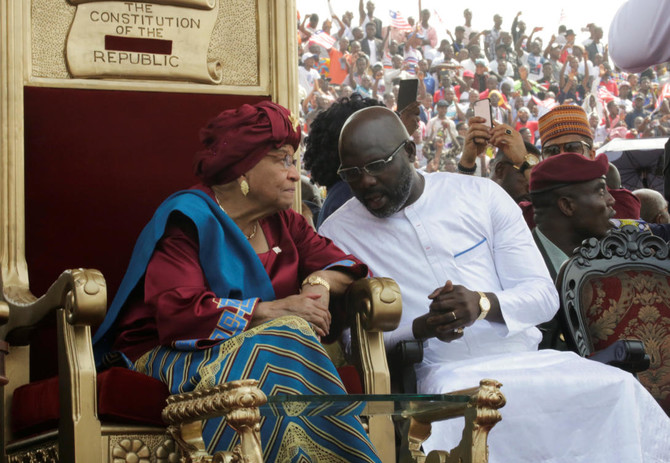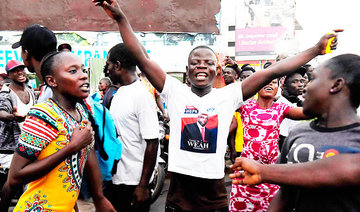MONROVIA: To the cheers of a crowd fired by his promise to bring them jobs and prosperity, former football star George Weah was sworn in as president of Liberia on Monday, completing the country’s first transition between democratically-elected leaders since 1944.
Weah, 51, took over from Nobel laureate Ellen Johnson Sirleaf, who over 12 years steered the country away from the trauma of a civil war, although prosperity eluded her.
Weah was sworn in as president by the chief justice of the Supreme Court, Francis Korkpor, at a packed sports stadium near the capital, Monrovia.
The presidents of Gabon, Ghana and Sierra Leone, along with friends and fellow African football stars, including Cameroonian legend Samuel Eto’o, watched as he took the historic oath of office.
“I have spent many years of my life in stadiums, but today is a feeling like no other,” Weah said, as he thanked Sirleaf for “laying the foundations on which we can now stand in peace.”
His first priorities, he said, would be to root out corruption and pay civil servants “a living wage,” and encourage the private sector.
But he urged the public to show solidarity for the tasks that lay ahead.
“United, we are certain to succeed as a nation, divided we are certain to fall,” he declared.
Crowds queued for kilometers (miles), singing, dancing and waving the Liberian flag as they waited for their hero, who rose from the slums of Monrovia to the nation’s highest office.
“Today is one of the most exciting days of my life,” said Benjamin Bee, a 21-year-old student at the University of Liberia as he waited in line with thousands of others.
“The man I’m supporting now, President Weah, is an icon, he is my role model. Today is not just an inaugural program for us Liberians, but signifies that Liberia has found itself.”
Weah played for a string of top-flight European teams in the 1990s and was crowned the world’s best player by FIFA and won the coveted Ballon d’Or prize, the only African to have achieved this.
After losing his first run at the presidency to Sirleaf in 2005, he spent the next dozen years attempting to gain political credibility to match his popularity, becoming a senator in 2014.
Sirleaf will be remembered for maintaining peace after the harrowing 1989-2003 civil war left an estimated 250,000 dead.
But extreme poverty remains entrenched. Liberia ranks 177th on the 188 countries in the Human Development Index compiled by the UN Development Programme, which assesses health, education and economic progress.
At a church service attended by Sirleaf and Weah on Sunday, the pair presented a united front following a bruising election campaign in which Sirleaf’s longtime vice president Joseph Boakai failed to convince as her successor while alleging fraud had marred the ballot.
Legal proceedings lodged by Boakai delayed a run-off vote to December 26, when Weah won a massive 61.5 percent of the vote.
The transition period also shrank, giving Weah less than a month to prepare for government rather than the three months initially scheduled.
Analysts hailed Liberia’s achievement in having two successive transitions of power by democratically-elected leaders.
But they were also mindful of the rocky road ahead, especially the challenges posed by sky-high public expectations and likely opposition to his reforms by the Liberia’s establishment.
Liberia’s depressed export economy is highly reliant on rubber and iron ore. More than 60 percent of its 4.6-million citizens are under 25, and many voted for Weah in the belief he would quickly boost employment.
“He will need to manage expectations carefully: this window of optimism will be short,” Elizabeth Donnelly, a research fellow at the London think tank, Chatham House, told AFP.
“Weah has already stated that he will seek more investment into the private sector — he understands that Liberia has a large youth population, whose expectations and needs he must satisfy.
“This means tangible change in terms of visible civil infrastructure, and it means more jobs and opportunity,” she said.
“But the reality is there is also a political establishment whose expectations he will also try to meet.”

























